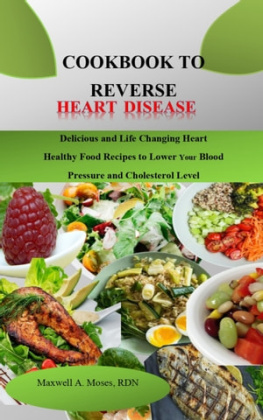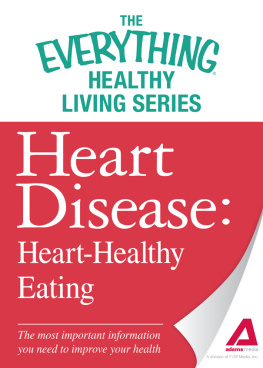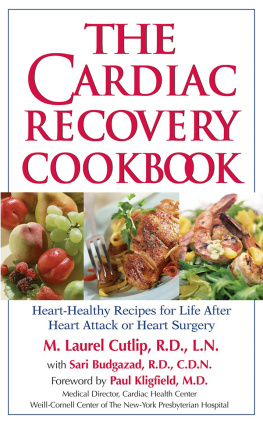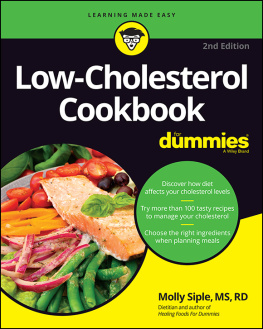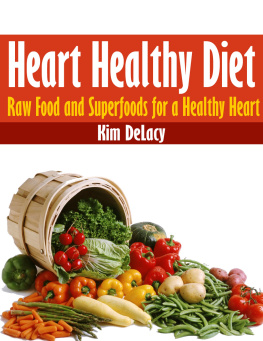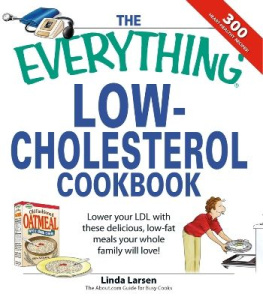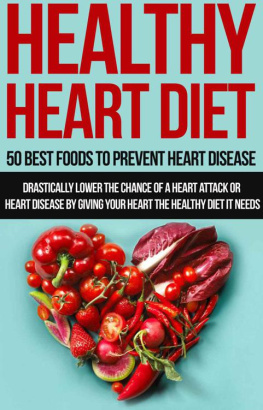The Complete
Heart Healthy Cookbook 2022
Healthy and Delicious Low Cholesterol, Low Sodium Recipes with 4-Week Meal Plan to Live Healthy
By Justin N. Ricks
Copyright 2022 By Justin N. Ricks
All Rights Reserved
This book is copyright protected. It is only for personal use. You cannot amend, distribute, sell, use, quote or paraphrase any part of the content within this book, without the consent of the author or publisher.
Under no circumstances will any blame or legal responsibility be held against the publisher, or author, for any damages, reparation, or monetary loss due to the information contained within this book, either directly or indirectly.
Disclaimer Notice:
Please note the information contained within this document is for educational and entertainment purposes only. All effort has been executed to present accurate, up-to-date, reliable, complete information. No warranties of any kind are declared or implied. Readers acknowledge that the author is not engaged in the rendering of legal, financial, medical or professional advice. The content within this book has been derived from various sources. Please consult a licensed professional before attempting any techniques outlined in this book.
By reading this document, the reader agrees that under no circumstances is the author responsible for any losses, direct or indirect, that are incurred as a result of the use of the information contained within this document, including, but not limited to, errors, omissions, or inaccuracies.
Table of Content
Introduction
Do you know that 1 out of every 4 Americans is suffering from some sort of heart disease? And that's not me saying it; the Centers for Disease Control and Prevention-CDC came up with those numbers, and as per their reports, about 610,000 people die from heart-related conditions each year. How alarming is that, right? Well, the rise of chronic diseases is the greatest dilemma of this decade, and somehow, we all are responsible for it! The shift to more of a sedentary lifestyle and poor dietary habits has led us into this health crisis. So, with little effort and understanding, we sure can reverse these patterns. In this cookbook, you will get to know how to prevent heart diseases through a change of lifestyle and dietary regime. By making smarter choices, you can even counter the challenges you are facing as a heart patient. Then, of course, there are some heart-healthy meal options that are provided in the recipe section of this book. You can try these nutritious recipes to make your routine more heart-friendly.
Chapter 1: The Basics of Heart Disease
How could one define heart disease? In simple words, any condition that would affect the health and functioning of the heart is defined as heart disease. It may sound simple to the ears, but heart illnesses are really complicated, and there are various factors responsible for different types of heart diseases. So, in this chapter, we shall try to unearth the whole concept and make sense of it because understanding always helps in better prevention and cure.
1.1 Understanding The Heart Disease
Heart or cardiovascular diseases are all the conditions that may slow down, disrupt, or obstruct the functioning of a heart. The term "cardiovascular" means relating to "heart and vessel" and that these diseases all include the damage or inefficiency caused by the blood vessels. These illnesses are categorized according to different causes and their respective symptoms. Some diseases can be managed through lifestyle adjustments, whereas others may need both medicinal and non-medicinal treatments. To better understand heart diseases, let me breakdown them into the different types and see how much damage they can cause:
An arrhythmia is an issue with your heart's pace or rhythm. It indicates your heart is beating too fast, too sluggish, or in an irregular manner. Tachycardia is a condition in which the heart beats quicker than usual. Bradycardia is a condition in which the heart beats too slowly. The most frequent type of arrhythmia is atrial fibrillation, which is characterized by a rapid and unpredictable heartbeat. A heart attack, smoking, congenital heart problems, and stress are all variables that might disrupt your heart's rhythm. Arrhythmias can also be caused by certain chemicals or medicines.
The buildup of lipids, cholesterol, and other chemicals in and on the walls of your arteries is known as atherosclerosis. This buildup is referred to as plaque. Because of the plaque, your arteries may narrow, restricting blood flow. If the plaque bursts, it can cause a blood clot. Despite the fact that atherosclerosis is most usually linked with the heart, it can affect arteries all over the body. The illness of atherosclerosis is treatable. A healthy lifestyle can help to prevent atherosclerosis.
Cardiomyopathy is a cardiac muscle condition that makes it difficult for your heart to pump blood throughout your body. Heart failure can result from cardiomyopathy. Dilated, hypertrophic, and restricted cardiomyopathy are the three primary forms of cardiomyopathy. The treatment methods are determined by the type of cardiomyopathy you have and how serious it is and may include drugs, surgically implanted devices, heart surgery, or, in severe cases, a heart transplant.
A congenital heart defect, also known as congenital heart disease, is a heart condition that occurs before birth. The condition can harm the heart's walls, valves, and blood arteries.
Congenital cardiac abnormalities come in a variety of shapes and sizes. They might range from basic illnesses with no symptoms to more sophisticated issues with life-threatening symptoms.
The accumulation of plaque in the arteries that provide oxygen-rich blood to your heart is known as coronary artery disease. Plaque creates a constriction or blockage in the arteries, potentially leading to a heart attack. Shortness of breath, discomfort and chest pain are common symptoms. Treatments may involve dietary changes, drugs to address your risk factors, and/or surgery.
1.2 Symptoms of the Heart Diseases:
The term "heart disease" refers to a variety of cardiovascular issues. Heart illness encompasses a wide range of diseases and ailments. The following are the many types of heart disease symptoms:
Arrhythmias
Atherosclerosis
Congenital heart defects
Coronary artery disease (CAD)
Cardiomyopathy




